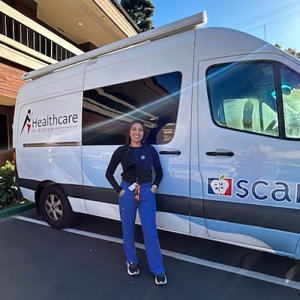Family Nurse Practitioner Provides Care on the Streets of San Diego
November 12, 2024 / by Jacqueline Mazarella- Alumni
In early 2022, Valeria Iniesta-Guzman, MSN ’23, was placed with a street medicine mobile unit providing care for the homeless population in Santa Ana, California. It was one of her clinical internship requirements for the Master of Science in Nursing (MSN) program at the USC Suzanne Dworak-Peck School of Social Work. For years she was a registered nurse in a hospital and then a traveling nurse, but decided she could do the most good as a family nurse practitioner (FNP), which is what brought her to USC and the pursuit of an advanced nursing degree.
Originally, she was focused on working in pediatrics at the completion of her graduate studies. However, during her rotation with the street medicine team, Iniesta-Guzman met an unhoused man with no family, who had immigrated from Mexico and did not speak any English.
“I think this particular patient felt very familiar to me because he was vulnerable, he needed someone to be strong, that spoke his language, and that would stand with him,” Iniesta-Guzman said. “And that was me.”
This moment changed her life.
“I got exposed to this specialty of street medicine and just fell in love with it,” Iniesta-Guzman said. “It felt absolutely right with my personality — the type of work, the flow, the patient population. It aligned with my desire to serve the community in a more impactful way through healthcare.”
Translating childhood love and support to make a difference
Iniesta-Guzman and her two older siblings grew up in Pomona, California, in a household with parents who had immigrated from Mexico.
“We grew up poor, but I also grew up with nothing but love and support,” Iniesta-Guzman said. “I always knew, in a way, that I’d be successful because I had no other option.”
She knew early on that she wanted to work in medicine, particularly in service to those in low-income communities where the odds are often stacked against them.
Since completing her MSN and passing her board certification to become a family nurse practitioner, Iniesta-Guzman now works full-time with Healthcare in Action, improving the lives of people experiencing homelessness through quality holistic care. As in her clinical placement, she is part of the street medicine team, working out of a medical mobile van in downtown San Diego and the Mission Bay area known as “the island.” She spends her days with a clinical support partner out on the streets looking for her patients, now tallying around 107.
“Half my job is looking for my patients downtown, and then the other half, when I do find them, is getting them to trust me, build rapport, show up for them and meet them where they’re at,” Iniesta-Guzman explains.
She has a set roster of patients who, regardless of where they are, want her as their provider because of the relationship they have built together.
In contrast to when Iniesta-Guzman was a registered nurse and student working in street medicine, now as a certified FNP she is able to provide the next level of care to her patients for which she aspired. FNPs have prescription authority, can order labs and images, and perform minor procedures requiring incision, drainage and sutures. For the MSN, students complete a rigorous program that includes 700+ hours of clinical training to prepare them to become FNPs.
“As a nurse practitioner I am able to medically diagnose,” Iniesta-Guzman said. “These diagnoses can include pneumonia, anemia, bipolar disorder, hypertension, for example, and I can then discuss prognoses and treatment plans with the patient.”
Iniesta-Guzman is in love with her work, and passionate about educating the general public to understand that there are many reasons that individuals become homeless. She stresses that they deserve support and not the scorn they often receive.
“The unhoused population is a very welcoming, strong, innovative population that sometimes is treated very sub-human,” Iniesta-Guzman said. “When you actually talk to them and hear their stories, there are so many layers and so many factors that led to their homelessness. Luckily, I work with a company that understands that and we’re all very passionate about this community.”
To reference the work of our faculty online, we ask that you directly quote their work where possible and attribute it to "FACULTY NAME, a professor in the USC Suzanne Dworak-Peck School of Social Work” (LINK: https://dworakpeck.usc.edu)
